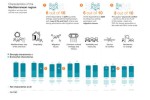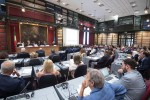2017 (EN)
23 June 2017
Tutte le Attività (EN) -
Anno 2017

A Euro-Mediterranean region which is not the victim of a "clash of civilisations", but of a "clash of ignorance", where stereotypes of the past still prevail and the "cultureisation" of conflicts promoted by some media and ideological interpretations. But also a region where there is still confidence in the possibility of a political project that enhances diversity and promotes innovation, entrepreneurship and young people's participation. This is the image that emerges from the Third Report on Intercultural Trends in the Mediterranean Euro Area, promoted by the Anna Lindh Foundation and the Ipsos Institute and conducted in 13 European countries and on the south-eastern shore of the Mediterranean.
Presented to the Chamber of Deputies, the Report is based on 13,000 interviews, collected from 15 years old and upwards in Finland, Poland, Austria, France, the Netherlands, Italy, Croatia and Portugal in Europe, and Israel, Jordan, Palestine, Tunisia and Algeria. And it also presents some surprising data, such as those that seem to dispel some myths about migration. To the question on which country he would choose if he could start his life again elsewhere, 60% of those interviewed on the south bank replied that he would still do so in the country of origin, compared to 15% who would choose Europe, 6% the Gulf and 5% North America. There are different figures for Europe, where only 36% would start again at home, 30% in another EU country and 12% in North America, 8% in Australia or Oceania. As for the Italians, 41% would still choose Italy and 25% another EU country, even if only 1% would go to the south of the Med. To indicate, according to the coordinator of the Eleonora Insalaco report, that at least in the south there remains a certain "optimism" about the future, together with the conviction - evident in other parts of the survey - that "North and South together can do more than national governments", and that there is room for Euro policies. This issue is directly linked to the purpose of the Report, i. e. to contribute, in line with the objectives of the Anna Lindh Foundation and with the wishes of the Maltese Presidency of the EU, to new neighbourhood policies with the southern shore. From the report - presented by the executive director of the Anna Lindh Foundation, amb. Hatem Atallah, Member of Parliament Khalid Chaouki, from the min. pl. Enrico Granara from the Ministry of Foreign Affairs, Ettore Greco from the Institute of International Affairs and Rima Marrouch from Bbc Arabic - a widespread conviction emerges that education and initiatives led by the younger generations are the best response to conflict and radicalisation. In this sense, at least 80% of respondents in Europe as well as on the other side, but particularly in Algeria, Jordan and Tunisia. The migration issue is perceived on both shores as one of the themes that accumulates them, along with lifestyles and cooking, but it is not the most important. In the north, only 44% perceive migrations as "strongly" associated with the Mediterranean - compared to 61%, which romantically looks more towards commonality in terms of lifestyle and cuisine - while in the south 60% are. In the south bank, however, hospitality is also emphasized as a common character (65%), along with the common historical and cultural heritage and lifestyle (52%). And this is despite the fact that in the south the "origin of conflicts" aspect - which the media generally insist on - is strongly associated with the Euro-Mediterranean area by 39% of the interviewees, compared to 25% in the north. In general, however, there is a "resistance", the authors of the report evaluate, to take on board the opinion of those who insist instead, in the north and south, on the negative aspects and factors that differentiate the two shores. In short, in general there is "a certain distance - the authors write - from the often discussed and much desired by extremists, clash of civilizations".
- DOCUMENT
- INVITATION
- PRESS RELEASE ANSA
- MEDNEWS







